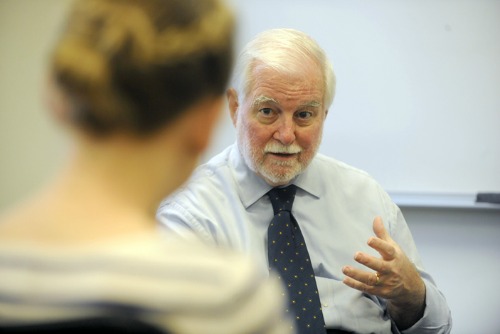The behavior of established doctors and senior residents has a profound effect on medical students who often model and internalize the behaviors they witness. Emory University researchers have found that a method of training doctors to be humanistic can result in a higher level of communication between doctor and patient.
"A great deal of what gets passed along to students is from being around someone for those four years and what that person conveys. A lot rubs off. But, humanism is a professional trait that is learned and can be taught," says William T. Branch Jr., MD, Carter Smith, Sr. Professor and past director of the General Internal Medicine Division at Emory University. "If we can teach it to all faculty, we can expect to see a big impact on the quality of care."
Over the past decade Branch has created a faculty development program with a group of 26 colleagues at other universities to help medical school faculty be better role models.
Now with a $164,450 grant from the Josiah Macy Jr. Foundation, Branch will create and test a 12-month faculty development program to help physician-teachers improve their humanistic skills and become better role models for the residents they supervise. Branch believes these changes could ultimately improve the learning climate of medical education and impact the overall culture of medicine.
Groups of eight promising physician-teachers from ten medical schools will be enrolled in the yearlong program that includes interactive role-play, storytelling, reflection exercises and lectures. Meeting every two weeks, physician-teachers will focus on learning skills to become better role models and teachers, how to be more effective advisors and mentors to residents, and how to teach caring attitudes and empathy.
"What sets this program apart is our focus on the teacher, we knew we had to develop a curriculum that was interactive because you have to practice it,'' explains Branch. "Faculty members coming out of residency training programs are in a position to become great role-models for the younger residents. We wanted to tap into that opportunity to reach new physician-teachers and engage them in a humanistic medicine curriculum that would have a sustained impact on their teaching over time.
"The fragmentation we see in medicine today and the business-oriented model of health care we now have has undermined that human quality in medicine that patients want," says Branch. "Patients don't want to be treated like a disease, they want to be treated like a person."
It's the picture of a humane health care system built on a foundation of compassion - the complete opposite of what Branch found as a bright-eyed ambitious resident in the 1960s. Faced with near 24-hour shifts, lack of sleep and a mounting case load, Branch learned to be quick and admits at times his compassion took a hit. He's since made it his life's work teaching experienced and future doctors how to maintain compassion.
Following implementation of the curriculum, investigators will evaluate the program by assessing the impact participating faculty had on the humanistic teaching and practices of their residents. As part of the evaluation, interns and medical students will rate the residents who have worked under a participant in the faculty development program on whether they are influential and positive role models.
"We are looking to see if faculty who took part in the program are making an impact, in terms of how they are perceived as humanistic doctors who care about their patients as people,'' says Branch. The ten institutions supported with Macy Funding include: Yale University; Stanford University; Boston Children's Hospital/Harvard University; Indiana University; Penn State University; Medical College of South Carolina; University of North Carolina Chapel Hill; Vanderbilt University; University of Virginia-Charlottesville and the Medical College of Wisconsin.
Founded in 1930, the Josiah Macy Jr. Foundation is the only national foundation solely dedicated to improving the education of health professionals.

